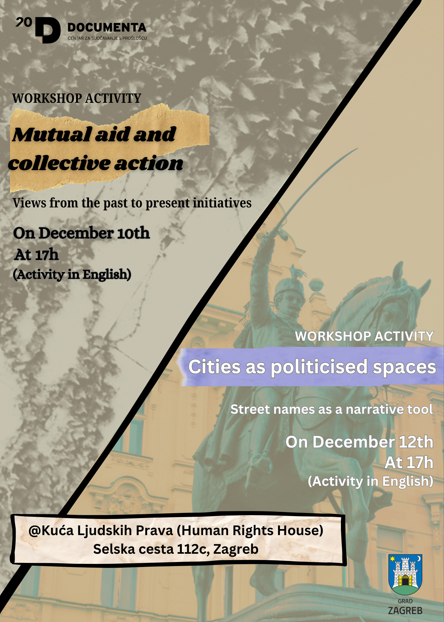Workshops on human rights, activism, and culture of memory

Join us for two workshops on human rights, activism, and culture of memory, organized by Documenta’s volounteers!
Mutual aid and Collective action – Views from the past to present initiatives
Date and Time: Tuesday, December 10th, 17h
Location: Kuća Ljudskih Prava (Human Rights House), Selska cesta 112C, 10000 Zagreb
Duration: 2 hours (approximately)
Language: English
This workshop aims to reflect and create a safe space for debate about different examples of mutual aid and collective action throughout the different periods of our history and up to present times initiatives. Join us for an activity that will make us understand what is mutual aid and collective action, how can it be organized both in the past and in the present and why has it always existed. We will try to think and spot different needs in our current society that would move us to engage or act in mutual aid based examples or come up with new ideas that could be put into practice.
____________________
Cities as politicised spaces – Street names as a narrative tool
Date and Time: Thursday, December 12th, 17h
Location: Kuća Ljudskih Prava (Human Rights House), Selska cesta 112C, 10000 Zagreb
Duration: 1 hour 30 minutes
Language: English
Join us for an engaging workshop that explores the political meanings embedded in urban landscapes. Cities are more than just physical spaces—they are shaped by narratives that reflect and reinforce political identities. One of the most visible markers of these identities is street names. Street names serve as narrative tools that perpetuate specific ideologies and histories. Changes in political identity often bring about significant shifts in these names, revealing evolving societal narratives. Using examples from iconic streets and squares in Zagreb, this workshop will provide a deep dive into how street names articulate political narratives. Participants will also take part in an interactive activity to redesign street names, creating new narratives that reflect their own perspectives.









